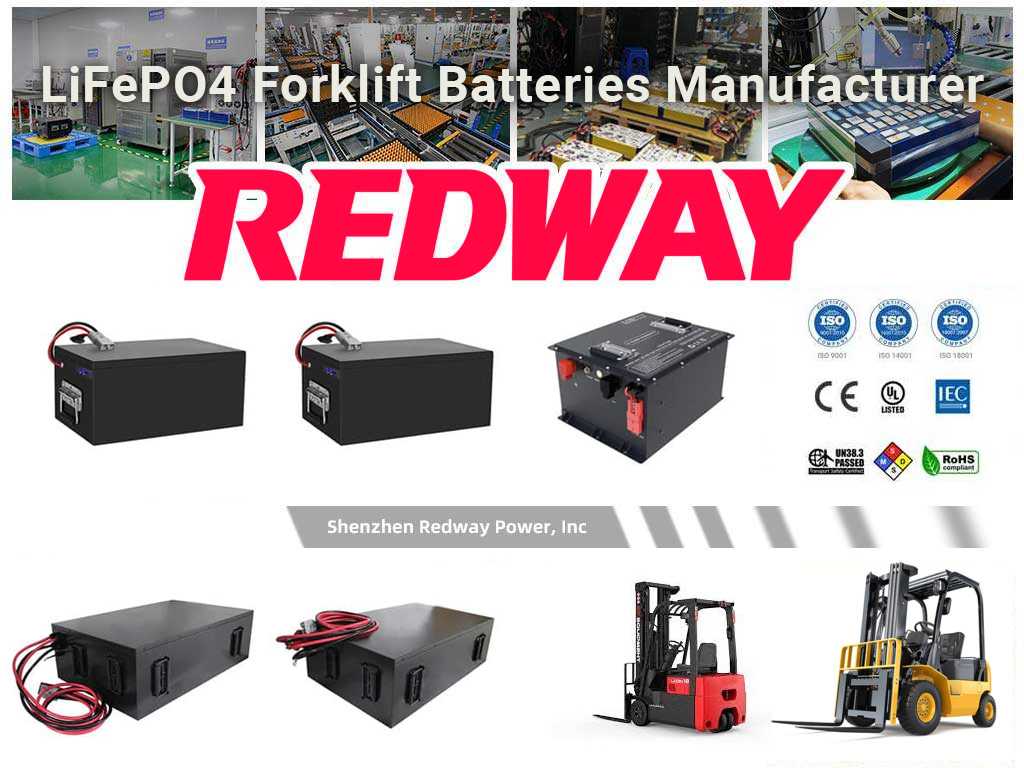In industrial operations, forklifts play a crucial role in material handling, and the batteries powering them are vital for ensuring efficiency, productivity, and cost-effectiveness. Selecting the appropriate forklift battery can significantly impact performance, reduce downtime, and optimize operational costs. Redway Battery, a leader in advanced lithium battery technology, recently has presented a detailed guide to forklift battery types to assist businesses in making well-informed decisions.
The Evolution of Forklift Batteries
The forklift battery market has evolved, offering a range of options to cater to diverse industrial needs. From traditional lead-acid batteries to modern lithium-ion (LiFePO4) solutions, each type offers distinct advantages and operational characteristics.
Primary Forklift Battery Types
1. Lead-Acid Batteries: A Time-Tested Solution
Lead-acid batteries, also known as wet-cell batteries, have been a mainstay in industrial applications for decades. These batteries utilize lead plates submerged in a sulfuric acid and water solution.
- Lifespan: Typically lasts 1,000 to 1,500 cycles, equivalent to 3 to 5 years with proper maintenance.
- Maintenance: Requires periodic watering to maintain electrolyte levels.
- Advantages:
- Availability: Widely used and easily sourced across industries.
- Affordability: Features a lower upfront cost compared to newer battery technologies.
2. Lithium-Ion (LiFePO4) Batteries: The Modern Standard
Lithium-ion batteries are transforming the material handling industry with their superior performance and low maintenance requirements.
- Lifespan: Lasts between 2,000 and 3,000 cycles, equating to 7 to 10 years of operation.
- Maintenance: Maintenance-free and requires no watering.
- Advantages:
- Fast Charging: Reduces downtime through rapid recharging capabilities.
- Safety and Durability: Sealed construction minimizes risks of spills or leaks.
- Eco-Friendly: Emits no harmful gases and has a lower environmental impact.
3. Absorbed Glass Mat (AGM) Batteries: A Spill-Proof Option
AGM batteries utilize a specialized glass mat to contain the electrolyte, making them spill-proof and maintenance-free.
- Lifespan: Comparable to lead-acid batteries, with variations depending on usage.
- Maintenance: Requires minimal upkeep.
- Advantages:
- Safety: Eliminates the risk of spills.
- Convenience: Provides a user-friendly option for operations requiring lower maintenance.
4. Tubular Plate Batteries: Designed for High Demand
Tubular plate batteries are tailored for extended operating times and high-load applications.
- Lifespan: Generally shorter than flat-plate alternatives.
- Advantages:
- Extended Runtime: Suitable for heavy-duty operations requiring prolonged energy delivery.
- Voltage Efficiency: Handles higher voltage demands effectively.
5. Waterless Batteries: Simplifying Maintenance Efforts
Waterless batteries reduce the need for frequent electrolyte refills, offering a low-maintenance alternative for busy industrial environments.
- Advantages:
- Reduced Labor: Requires less frequent maintenance, saving time and costs.
- Efficiency: Ideal for operations with limited personnel for maintenance tasks.
6. Thin Plate Pure Lead (TPPL) Batteries: A Cost-Effective Alternative
TPPL batteries provide some of the advantages of lithium-ion technology at a more affordable price point.
- Advantages:
- Maintenance-Free: Does not require regular servicing.
- Cost-Effective: Balances performance and affordability.
Comparing Forklift Battery Options
Each type of forklift battery offers distinct characteristics, making it essential to evaluate operational requirements before making a selection:
- Lead-Acid Batteries: Best suited for businesses focused on affordability, with resources for regular maintenance.
- Lithium-Ion Batteries: Ideal for modern operations emphasizing efficiency, fast charging, and long lifespans.
- AGM Batteries: Designed for environments requiring spill-proof and low-maintenance solutions.
- Tubular Plate Batteries: Preferred for applications demanding extended runtime and high energy output.
- Waterless Batteries: Tailored for operations aiming to minimize maintenance efforts.
- TPPL Batteries: A practical choice for balancing cost and convenience.
The Benefits of Lithium-Ion (LiFePO4) Technology
Lithium-ion batteries, particularly those utilizing LiFePO4 technology, are gaining prominence due to their unmatched efficiency and eco-friendly attributes.
Key Advantages of LiFePO4 Batteries
- Enhanced Energy Density: Delivers superior performance in a compact design.
- Sustainability: Features recyclable components and emits no harmful gases.
- Long-Term Savings: Higher initial investment is offset by reduced maintenance and extended operational life.
Factors to Consider When Selecting a Forklift Battery
Choosing the right forklift battery involves analyzing various operational parameters:
- Energy Requirements: Evaluate the power demands and runtime needs of the equipment.
- Maintenance Capabilities: Assess the ability to manage maintenance requirements, if any.
- Budget Constraints: Consider both upfront costs and long-term operational savings.
- Environmental Goals: Select technologies aligned with sustainability initiatives.
The Role of Redway Battery in Forklift Power Solutions
Redway Battery stands at the forefront of forklift battery innovation, offering high-quality lithium battery solutions designed for industrial applications.
Technological Expertise
Specializing in advanced LiFePO4 technology, Redway Battery delivers unmatched reliability, safety, and efficiency.
Custom Solutions
Redway Battery provides tailored lithium battery solutions to meet specific industrial requirements, ensuring optimal performance and compatibility.
Commitment to Sustainability
By prioritizing eco-friendly manufacturing processes, Redway Battery supports industrial sustainability efforts worldwide.
FAQs About Forklift Batteries
How long do forklift batteries typically last?
The lifespan varies by type. Lead-acid batteries last around 3 to 5 years, while lithium-ion batteries offer 7 to 10 years of service.
What makes lithium-ion batteries more efficient than lead-acid batteries?
Lithium-ion batteries provide longer lifespans, faster charging, and maintenance-free operation, resulting in greater overall efficiency.
Are lithium batteries compatible with all forklifts?
Compatibility depends on the forklift model. It is essential to verify specifications before transitioning to lithium batteries.
Conclusion
Understanding the types of forklift batteries and their respective benefits is crucial for optimizing industrial operations. Traditional lead-acid batteries remain a reliable choice for cost-sensitive applications, while lithium-ion batteries are emerging as the preferred solution for their efficiency, longevity, and environmental advantages.
Redway Battery continues to lead the charge in forklift battery innovation, providing cutting-edge LiFePO4 solutions designed to enhance operational performance and sustainability in material handling equipment.
Media Contact
Company Name: Redway Battery Tech
Contact Person: Mr. Smith
Email: Send Email
Country: United States
Website: https://www.redway-tech.com/

